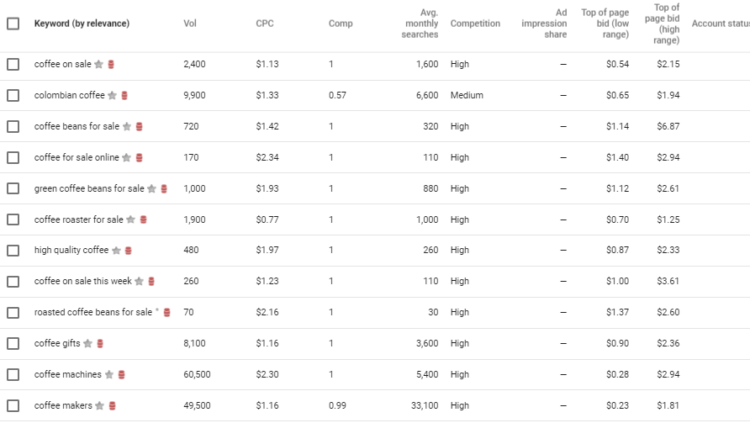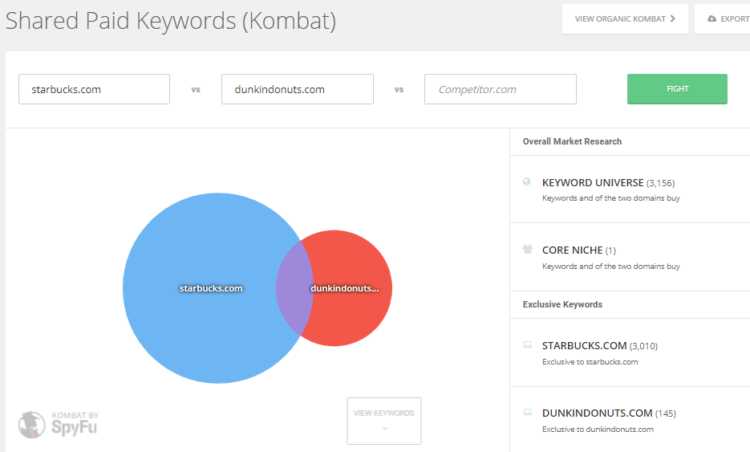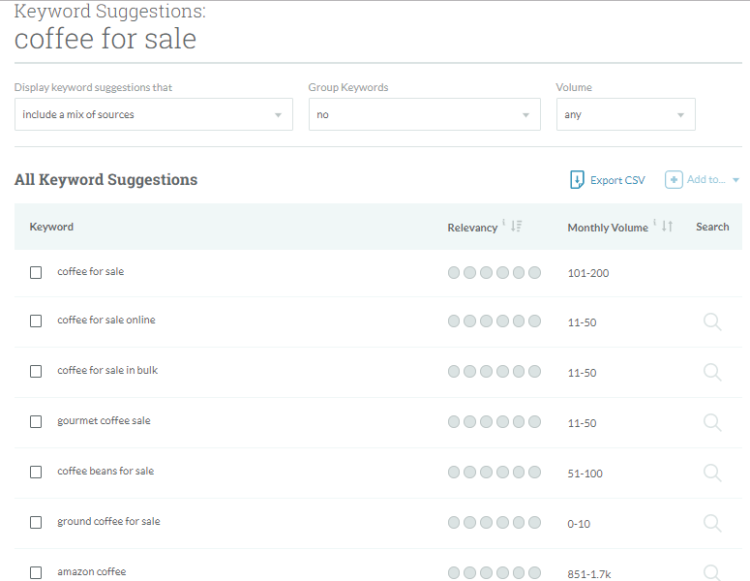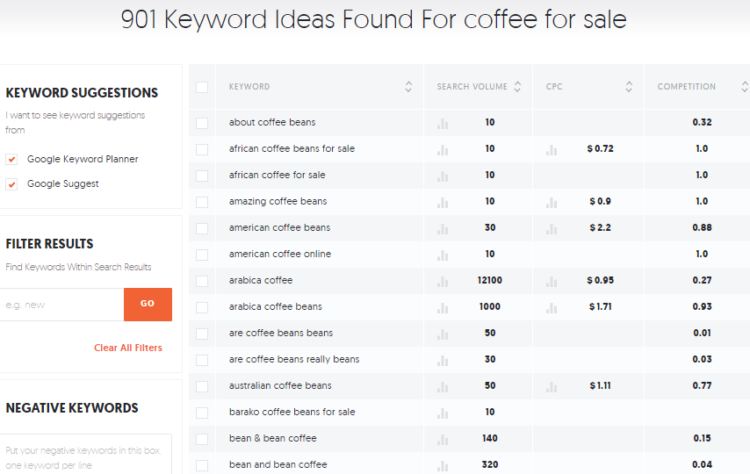Keyword Generation and Research Tips For PPC Campaigns
We know that great keywords are a vital part of a successful AdWords campaign, but how do we find them? Conducting research to find those relevant keywords may seem daunting, but it’s not impossible with some dedication.
Make your keyword research as painless and productive as possible with the recommendations and resources below.
Define Your Keyword Strategy & Goal
Before we begin keyword research, the first step is to define our goal for our ad campaign and then the keyword strategy. To get ourselves heading in the right direction, we can ask questions like:
- Why are we creating an ad campaign?
- What product are we selling?
- Who is our audience?
- How would our audience think about this product?
- What do we want to accomplish with this campaign? What is our end goal?
Defining the strategy straight away keeps us on task as we go through our research, providing a guide as we explore all the possibilities our research might reveal.
Think from Your Audience’s Point of View
Once we know who our audience is and how our product relates, then we need to think from their point of view when conducting keyword research. This allows us to understand how they search for our products so we can formulate specific keyword lists and ad groups that are relevant to their searches.
While we decide on our keywords, we need to ask these questions about our audience:
- What is our audience searching for?
- What would we expect them to search for?
- What is their intent? What are they looking to find?
- What keywords will best help them find our ads and our website?
Once we can answer these questions, then we can begin our PPC keyword research.
Look at Your Website Content
Some of the best keywords for our campaign can be found by looking at our website content and landing pages. Which words on our site stand out and represent our product? Are there any possible variations or synonyms of these terms?
Example: If we are a coffee distributor, variations of “coffee” that we sell may include “dark roast,” “espresso,” “house blend” and “Sumatra.”
These terms are more specific than just “coffee” and will yield better search results.
Who Are Our Competitors?
Often, we should include competitors’ branded keywords in our campaigns. This allows our ads to compete, so if someone searches for a competitor’s name, then our ad will show alongside theirs.
The advantage to this is it gives us an edge over our competition, but a disadvantage is that bidding on branded keywords can be expensive. If we are going to bid on these terms, let’s organize those in a separate competitor campaign. This lets us know how many impressions are generated by searches for competitor terms and better measure effectiveness of these campaigns.
Since building a competitor branded campaign can be time-consuming and costly, keep in mind your budget, bid strategy, and campaign goals before you do so.
Published: May 13, 2015
Include Long-Tail Keywords
While they might receive fewer searches than broader terms, using long-tail keywords in your PPC campaign drives specific traffic to your site. For our coffee distributor example, long-tail keywords we could use include “dark roast coffee for sale” and “12oz package house blend.”
Users searching these terms know exactly what they are looking for, so having these keywords in our campaign will lead users directly to our site. Because of the lower search volume compared to broader, generic terms, ads that show from these long-tail keywords have a better chance of ranking higher and above competitors’ ads.
Since long-tail keywords are specific terms, they have less competition from similar websites, so the chance our ads will show and rank high for long-tail search queries is increased. Using long-tail keywords also raises our quality score, which leads to higher CTR and conversions.
Use Keyword Research Tools
In addition to looking at you and your competitors’ content to formulate keywords, research for unique keyword ideas can be conducted through external sources. Here are some resources we love to use at LunaMetrics:
1. Google AdWords Keyword Planner

Google’s Keyword Planner in the AdWords interface
If you already have an ad account set up, then you have access to the AdWords Keyword Planner. Access this feature in the Settings section – the wrench icon in the new interface.

By entering in popular keywords for your site, the Keyword Planner generates possible results related to your keywords and content. You are able to enter in three keywords or keyword phrases at a time to the Keyword Planner, so choose those which are relevant to your product and you should see a good amount of results.
Bid information such as CPC, average monthly searches, ad impression share, and competition will populate, which helps plan your budgets. You can download this information to a spreadsheet to save for later or present to clients. You can directly add keywords in the Keyword Planner to your ad groups, specifying match type.
2. SpyFu

The Kombat feature in SpyFu. Starbucks.com vs. DunkinDonuts.com
SpyFu is extremely helpful for competitor keyword research! Enter your keywords into the “Keyword Research” tab and SpyFu will return data on monthly searches, CTR, CPC, AdWords buy recommendations and competitors who recently bought each keyword.
In the “Kombat” tool, enter in one or multiple competitor websites to see what keywords they are bidding on. This will generate unique ideas and gives your ads and content a good stance among the competition. A downside to using SpyFu is that the keywords only include those which are added to SpyFu’s database by competitors, so Kombat may not return a full or updated list of keywords.
3. MOZ Keyword Explorer

Keyword Explorer feature in Moz
Enter any keywords or search queries into MOZ’s Keyword Explorer, and you will get keyword suggestions with monthly search volume. After keyword suggestions populate, they can be displayed to:
- include keywords with all query terms
- exclude terms to get broader ideas
- include keywords based on closely or broadly related topics and synonyms
- include those which are related to keywords with similar results pages
- include those which are questions-only
You can also enter a domain into Keyword Explorer and MOZ will pull top ranking keywords for that domain. Compare this domain with competitors to get a list of keywords for which you could also be ranking.

Ranking Keywords for www.starbucks.com
The Keyword Explorer is mostly used for organic keywords but is still helpful for conducting PPC research. From these results, you’ll have to determine which keywords or keyword phrases may work for your PPC campaigns, and their expected bid cost.
4. UberSuggest

UberSuggest Keyword Suggestions for “coffee for sale”.
UberSuggest.io returns keyword suggestions related to your content, with search volume, CPC, and competition for each keyword result directly pulled from AdWords. When searching “coffee beans,” we receive long-tail suggestions that will work for PPC campaigns.
Data in UberSuggest comes from the Google Keyword Planner and Google Suggest, populating a healthy mix of useful keywords for your campaigns and making UberSuggest a very useful tool.
5. Google Search Queries

Google Search Queries in Action to Retrieve Keyword Ideas
Another effective keyword research method is conducted by entering search queries into Google! Google automatically suggests popular searches, making this a great method to find keyword ideas and what users search for the most.
Enter a keyword or phrase, and continue through your keyboard with each letter to see popular searches. For “coffee beans,” some search queries I found through Google include “coffee beans wholesale,” “coffee beans espresso,” and “coffee beans shop.” For a business that sells coffee beans, all of these might be perfect to use.
Tip: The search volume, CPC, and competition next to each query in the above screenshot is populated from a Chrome and Firefox extension called Keywords Everywhere. It’s beneficial for looking at keyword data on the go and I use it all the time. I recommend you check out Megan’s blog post on Chrome extensions for more ideas as well.
Identify Negative Keywords
Creating your keyword list is important, and identifying negative keywords for your campaigns is important as well. A negative keyword is anything that does not relate to your site’s content or ad content, therefore you would not want it to trigger your ad in a related search. If your business is a coffee shop, and you use the keyword “java,” you should add any keywords that have to do with Java programming to your negative keyword list. We don’t want ads for a coffee shop triggering for Java data structures.
Search Term Reporting

Search Term Reporting Function in the New AdWords Interface
After your campaigns are running, an easy way to identify possible negative keywords is to use the Search Term reporting function in AdWords. In this report, you can see what terms users are searching for that trigger your ads, and you can identify any possible keywords to exclude.
We recommend pulling the Search Term report once a month to see how your keywords are optimized for each campaign and to make adjustments as necessary.
Read more about identifying negative keywords and creating your list in Zach’s post:
Published: April 25, 2017
When your keyword research is complete and you have relevant keywords and negative keywords for campaigns, organize them into ad groups. Each ad group should follow a specific theme or revolve around a certain product or service that your organization offers.
Organizing similar keywords into ad groups allows you to create effective ads and target them to the proper audience and their searches. Conducting keyword research is important for building out effective PPC campaigns that lead to conversions and increase ROI.
By following our recommendations and research tips, and using keyword planning tools reviewed in this post, you will be well on your way to creating AdWords campaigns that will achieve desired results!


